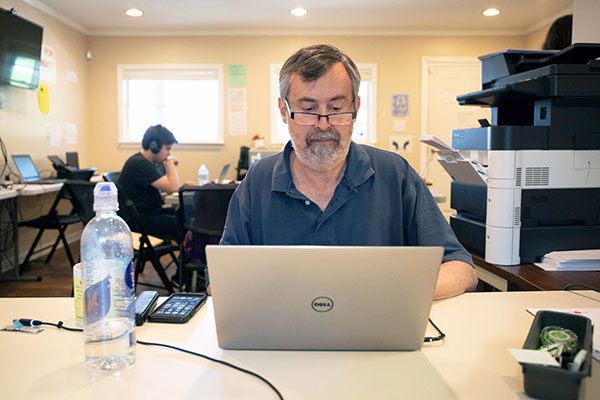Eric Popkin
Eric Popkin
An Activist's Heart
Eric Popkin's Unique Community-Based Learning Approach Gives Students an Inside Look at Immigration Issues
Eric Popkin is an activist at heart.
In the 1980s while an undergraduate at the University of Wisconsin-Madison, he dropped out of college and traveled to the U.S.-Mexico border to work with Central American refugees fleeing horrendous conditions and wars in El Salvador and Guatemala.

Eric Popkin, Associate Professor of Sociology
After working at the grassroots level in advocacy as an immigrant and refugee activist and leading human rights delegations to Central America for members of Congress, religious leaders, and others in the 1980s, Popkin transformed the nature of his activism, becoming an academic.
He is associate professor and chair of the Department of Sociology at Colorado College. Popkin has continued with his local and national activist work in the area of immigrant rights while simultaneously teaching community engaged courses at CC.
In Summer 2018, Popkin took 10 CC students to immigrant detention centers in Georgia, where they worked with the Southern Poverty Law Center's Southeast Immigrant Freedom Initiative. Students conducted background research and interviews with immigrant-detained clients, often in Spanish. The SPLC has praised the work of Popkin's students, who supported SPLC attorneys.
"I want to teach and introduce these concepts and opportunities to students and others," Popkin says. "These are complicated situations where the issues are not black and white. The ambiguity tied to experiential education is a big part of its allure - equipping students with the capacity to find answers on their own. Students have to figure things out. You can't prepare them for everything, but you can give them the tools."
"The ambiguity tied to experiential education is a big part of its allure - equipping students with the capacity to find answers on their own."
- Eric Popkin, associate professor of sociology
This innovative arrangement where undergraduate students work directly with the SPLC's attorneys and detained immigrants through the SIFI program is the only such program in the United States. Actually engaging in the work, speaking to attorneys, leads students to more sophisticated insights about tough subjects. They gain hands-on experience and contribute to a project that is legally representing immigrants in detention. Students also create and make a presentation to the campus community.

Since arriving at CC, Eric Popkin has taught Globalization and Immigration on the U.S.-Mexico Border, a class that examines immigration dynamics and policy in the border region. Recent iterations of the course have focused on the increasing criminalization of immigration policy, including the rapid dependence on immigrant detention. Read more in the Bulletin.
The outcomes of this work are impressive.
"I have several students now going to top law schools wanting to do immigration law," he says. "One who just got a job last year went with me to a family immigrant detention center in Texas; she was invited to go back and work with them. She engaged in community based research work, which led to a job as a paralegal in Houston for a prestigious immigration law firm. Another student is at NYU law school to pursue immigration law."
Popkin says his guiding principle is collaboration.
"I've always emphasized community-engaged pedagogy, collaborating with community organizations both locally and internationally for the co-creation of educational programming and curriculum, and it's really rewarding. We're always trying to assess the need of the community organization we're working with and collaboratively exploring what it should look like. We're designing a program together."
